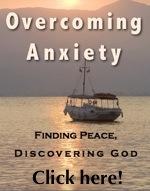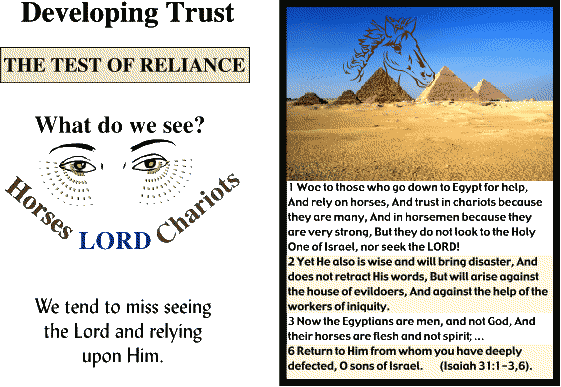|
1 Woe to those who go down to Egypt for help, And rely on horses, And trust in chariots because they are many, And in horsemen because they are very strong, But they do not look to the Holy One of Israel, nor seek the LORD!
2 Yet He also is wise and will bring disaster, And does not retract His words, But will arise against the house of evildoers, And against the help of the workers of iniquity.
3 Now the Egyptians are men, and not God, And their horses are flesh and not spirit; ...
6 Return to Him from whom you have deeply defected, O sons of Israel. (Isaiah 31:1-3,6).
|
 God uses illustrations to help us understand truths. God uses illustrations to help us understand truths.
This ancient Middle East war story shows the necessity of trusting in the LORD for help. Israel was sandwiched in between two empires, Assyria and Egypt. The empire Assyria threatened the tiny country of Israel. To God's great grief, Israel turned to Egypt for help rather than Himself. How long does God's people have to keep turning away from God? Why don't they return to Him now?
This example might go back a number of years in history but is typical of the problems and temptations we face in everyday life. Once we find something to protect our deep needs (securities), we have confidence and peace. We become very protective of this this peace. Even when God is prompting us to turn to Him for protection and provision of that need, we tend to resist Him. After reading the verses on your right from Isaiah 31, note below six important teachings from this passage.
1) We face problems in life that we need help with.
(1) ... those who go down to Egypt for help,
2) Danger (woe) accompanies those who trust other things than God to help them.
(1) Woe to those ...
3) We typically look for help in powerful things that exert strength.
(1) And rely on horses, And trust in chariots because they are many, And in horsemen because they are very strong,
4) God will cause those other things we trust in to fail us.
(2) Yet He also is wise and will bring disaster,
(3) Now the Egyptians are men, and not God, And their horses are flesh and not spirit; ..
5) Those who rely on things other than Himself are called defectors.
(6) ... you have deeply defected, O sons of Israel.
6) God is calling His people back to Himself.
(6) Return to Him from whom you have deeply defected...
They should have returned to Him. Why didn't they return to God?
- Isn't God more powerful?
- Isn't God wiser?
- Isn't God more loving?
We see four key problems:
• They thought their plan was better than God's.
• They believed Egypt could help them.
• They did not believe God could really help them.
• They refused to obey God. They were rebellious.
Are any of these things true with us? Do we use degrees, wealth, looks, position, reputation, cleverness, etc. to get what we need?
Just think about Enron, a huge mega-corporation, with all the people's retirement funds.In an instant it is gone with the wind. Once it stood as one of the most celebrated companies of the world, but now it resides in the dust of the courtrooms. Where are those people who trusted in it for security? The same will no doubt happen to every big government scheme to provide for our retirement funds.
God wants us to identify our weaknesses and come to Him for help now. We can best do this by discovering the things that we fear the most. Fears alert us to the vulnerable spots that stand well guarded. Israel should have noted that they feared Assyria because of the threat it posed to their national and personal welfare. They should have at that point humbly confessed their weakness and deseprately cried out to God for help.
Chart: Detecting the Idolatry in Our Hearts
Stage #1
Normal trust:
|
Without a crisis in our lives, we are not so sure who we really trust. Without a problem we do not think there is a problem. In fact we are not so sure if we trust self or God.
|
The Israelites couldn't easily see their idolatry before this crisis. They looked good and religious. |
Stage #2
Fears arise:
|
The crisis comes about when we have one or more things that we consider valuable threatened. Fears will arise. The key is how will we respond. |
The Assyrians threatened the security of the Israelite's life and livelihood.
|
Stage #3
Response to Crisis:
|
It is fine to discover our weaknesses. The problem is how we respond to them! Will we cast ourselves upon God or find other resources? |
They saw a great need for protection. This is fine, but then they trusted in Egypt rather than God. |
Stage #4
Trust Revealed:
|
Whom we trust shows what we really trust. We trust in a certain person, philosophy, medicine, etc. because it will help you. You think more of its power rather than God's power. |
They thought real protection came from military might. Egypt had it so they compromised and made an alliance with her. |
Crisis situations reveal our true trusts. They expose the idolatry of our hearts. In this case they thought more of chariots and horses than the Almighty God. This was not easily seen before this event.
For this reason we see that God tests our hearts. In fact, He knows whether we trust Him. He reveals our idolatry that we might repent. Unfortunately, many times we don't trust Him, and He needs to break down our trust in such things.
And you shall remember all the way which the LORD your God has led you in the wilderness these forty years, that He might humble you, testing you, to know what was in your heart, whether you would keep His commandments or not. (Deuteronomy 8:2).
|
Next week we will look at God's special promise to take care of all our needs. We will make that session very practical. Before I close, I would like to share a simple illustration.
I'd like to share with you the preciousness of God's love. Next page
|


